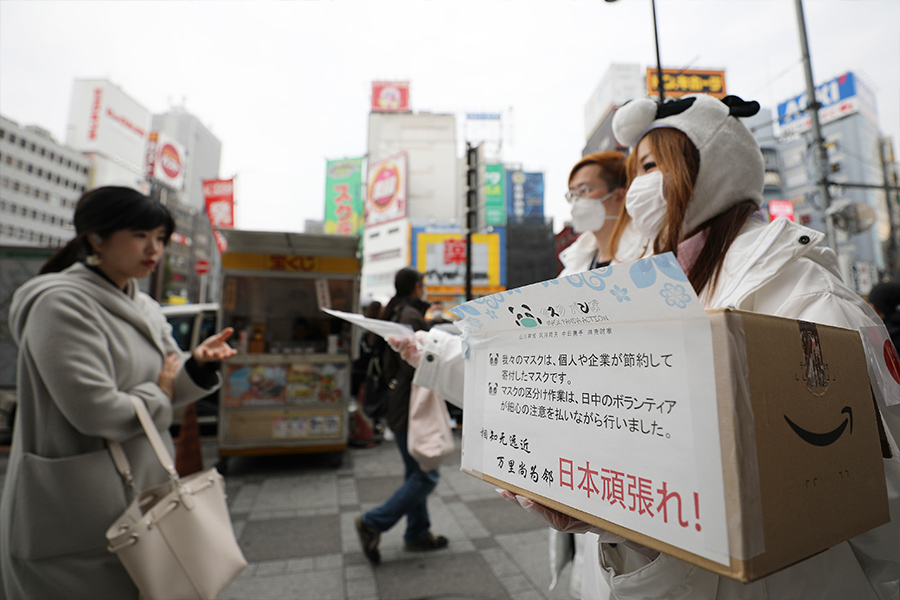Nations act to contain rising cases


Countries are getting more prepared to fight the novel coronavirus outbreak, as the world saw big upswings in new cases and the World Health Organization raised its global risk assessment of the virus from "high" to "very high."
In Japan, where participants in the Tokyo Marathon were curbed to 200 from around 40,000, the number of people infected on Sunday reached 955, including 705 from the Diamond Princess cruise ship. The country has pledged to use reserved funds of over 270 billion yen ($2.5 billion) to tackle the epidemic and its economic fallout.
South Korean President Moon Jae-in pledged on Sunday an "all-out response" by the government to contain the virus as the country reported 586 new cases, taking the total to 3,736.
Meanwhile, the United States reported the country's second coronavirus death, while Australia and Thailand reported their first deaths on Sunday. The number of infection cases reached 1,128 in Italy, 593 in Iran and 100 in France. As a result, the virus had been found in at least 60 countries in the world, with at least 7,258 people infected and more than 100 deaths outside China.
On Friday, WHO Director-General Tedros Adhanom Ghebreyesus said at a news conference, "The continued increase in the number of cases, and the number of affected countries over the last few days, are clearly of concern."
Japanese Prime Minister Shinzo Abe said Japan will take all possible steps needed to cope with the impact of the outbreak.
Abe, who had taken a relatively relaxed approach to the virus since its outbreak, shocked many by requesting the country's schools to close for about a month from Monday after Hokkaido, the most-affected prefecture in Japan with more than 70 cases confirmed, declared a state of emergency, urging all residents to remain at home during the weekend.
"The next week or two will be a critical time for Japan to see whether we will enter a rapid expansion phase of infections or we will be able to bring it toward an end," Abe said as he asked for support from the public for his decision.
Abe said funds will be used to support small firms hit by the virus-triggered economic slowdown and to compensate parents who lose income because of taking time off work due to school closures.
In response, each municipality in Japan will have to decide whether to comply with Abe's request, as the measure could affect more than 12 million students and 36,000 schools across the country.
Nobuhiko Okabe, head of the Kawasaki City Institute for Public Health and a member of Japan's expert panel on the virus, said the decision was a political one made without consulting experts on its effectiveness.
"It may work to some extent, but should be tailored to each region," Okabe said.
Meanwhile, Toshihito Kumagai, mayor of Chiba, said on social media that the decision was "shocking" and warned of severe social consequences if parents in key occupations are forced to stop working.
The city decided to close all public high schools and junior high schools but keep elementary schools open for first and second graders.
On Sunday, which is also Independence Day in South Korea, commemorating the independence movement against Japanese colonial rule, Moon called for national unity and cross-border cooperation to fight the epidemic.
"The outbreak can threaten our lives temporarily, but it cannot break our unity and hope," Moon said, adding that Japan and South Korea should cope with crises together and "make joint efforts for future-oriented cooperative relations".
According to the Korea Centers for Disease Control and Prevention, nearly 90 percent of the cases in South Korea happened in the southern city of Daegu and its neighboring North Gyeongsang Province, with more than half of all cases related to the Shincheonji Church of Jesus in Daegu.
After identifying and announcing the link with the church on Feb 18, South Korean authorities raced to contain the spread of the virus, tracking down thousands of attendees to trace their contacts and symptoms. It took a week before the church gave a list of its members' names to authorities.
On Sunday, Kim Shin-chang, director of international missions for the Shincheonji Church of Jesus, apologized "to the Korean people for the worries we have caused", but denied responsibility, saying the authorities were trying to "exaggerate" its involvement to shift blame.
Chen Weihua in Brussels and AFP contributed to this story.
- Legal tools essential for AI regulation
- China launches remote-sensing satellite for Algeria
- China reports drop in workplace accidents, fatalities in 2025
- From Kansas to karst: Unpacking Guangxi's charms
- China carries out nearly 8.5m hectares of land greening in 2025
- Chongqing red leaf festival draws record 4.7 million visitors




































